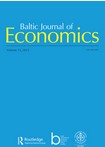Measuring the effects of inflation and inflation uncertainty on output growth in the central and eastern European countries
Measuring the effects of inflation and inflation uncertainty on output growth in the central and eastern European countries
Author(s): Dejan Živkov, Jelena Kovačević, Nataša Papić-BlagojevićSubject(s): National Economy, Economic policy, Evaluation research, Economic development, Financial Markets
Published by: BICEPS/SSE Riga
Keywords: Inflation; inflation uncertainty; GDP growth; GARCH; Bayesian quantile regression;
Summary/Abstract: This paper investigates how inflation and its uncertainty impact GDP growth in eight Central and Eastern European Countries. Inflation uncertainty series are created examining several GARCH models in combination with three different distribution functions, while the nonlinear effect of inflation and its uncertainty on GDP growth is assessed in the Bayesian quantile regression framework. We find that inflation has significantly smaller negative effect on GDP growth than inflation uncertainty, which confirms the Friedman hypothesis. This means that inflation in the selected countries has an indirect impact on GDP growth via inflation uncertainty. We find that countries with smaller economy, such as Latvia and Estonia experience more adverse effect from inflation uncertainty in both upturn and downturn conditions, probably because they are vulnerable to external inflationary shocks. As for the countries with bigger economy, inflation uncertainty shocks diminish GDP growth only in conditions when output growth is very low or negative.
Journal: Baltic Journal of Economics
- Issue Year: 20/2020
- Issue No: 2
- Page Range: 218-242
- Page Count: 25
- Language: English

